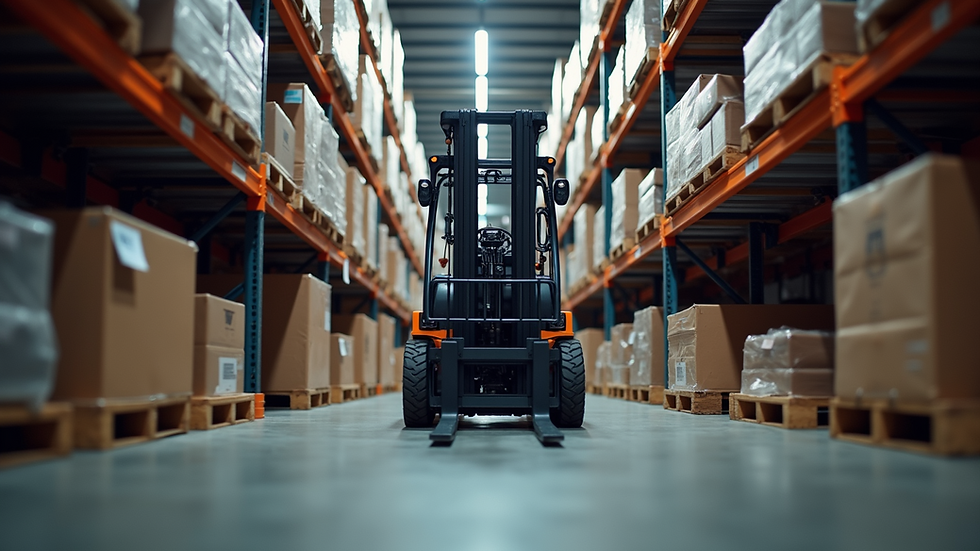Common Forklift Issues and How to Address Them
- Michael Gray

- Jul 28, 2025
- 3 min read
Forklifts are vital machines in warehouses, construction sites, and manufacturing plants. They help move heavy loads efficiently and safely. However, like any machinery, forklifts can experience issues that affect their performance and safety. Understanding common forklift problems and how to fix them can save time, reduce downtime, and prevent costly repairs.
Identifying Common Forklift Problems and Forklift Repair Solutions
Forklifts face various mechanical and operational issues. Recognizing these problems early can help you take the right steps to fix them. Here are some of the most frequent forklift issues and practical ways to address them:
1. Battery and Electrical Problems
Electric forklifts rely heavily on their batteries and electrical systems. Common issues include:
Battery not charging or holding charge
Corroded battery terminals
Faulty wiring or blown fuses
How to fix:
Regularly check battery water levels and top up with distilled water if needed.
Clean battery terminals to remove corrosion using a baking soda solution and a wire brush.
Inspect wiring for damage and replace blown fuses promptly.
Schedule routine battery maintenance to extend battery life.
2. Hydraulic System Failures
Hydraulics control the lifting and tilting functions of a forklift. Problems here can cause slow or jerky movements.
Common signs:
Leaking hydraulic fluid
Slow lift or tilt response
Unusual noises during operation
How to fix:
Check hydraulic fluid levels and refill with the recommended type if low.
Inspect hoses and seals for leaks or cracks and replace damaged parts.
Bleed the hydraulic system to remove air pockets that can affect performance.
Use high-quality hydraulic fluid to prevent contamination and wear.
3. Tire Wear and Damage
Tires are critical for forklift stability and maneuverability. Worn or damaged tires can lead to accidents or uneven lifting.
Common issues:
Flat or punctured tires
Uneven tire wear
Cracks or chunks missing from tires
How to fix:
Regularly inspect tires for wear and damage.
Replace tires that are excessively worn or damaged.
Maintain proper tire pressure for pneumatic tires.
Rotate tires periodically to ensure even wear.

4. Engine and Transmission Troubles
Internal combustion forklifts may experience engine or transmission problems such as:
Difficulty starting
Loss of power
Transmission slipping or jerking
How to fix:
Perform regular oil changes and replace filters as per manufacturer guidelines.
Check spark plugs and replace if worn or fouled.
Inspect transmission fluid levels and condition; change fluid if dirty or burnt.
Address any unusual noises or vibrations immediately by consulting a professional.
How Forklift Repair Services Can Help
When forklift issues become complex or beyond routine maintenance, professional help is essential. Expert forklift repair services offer comprehensive diagnostics and repairs to keep your equipment running smoothly.
Benefits of professional forklift repair services include:
Access to specialized tools and genuine parts
Experienced technicians who understand forklift mechanics
Faster turnaround times to minimize downtime
Preventive maintenance programs to avoid future breakdowns
Using professional services ensures safety compliance and extends the lifespan of your forklift.

How much is a forklift service?
The cost of forklift service varies depending on the type of service, the forklift model, and the extent of repairs needed. Here are some general pricing guidelines:
Basic maintenance service: $150 - $300
Battery replacement: $200 - $600
Hydraulic system repair: $300 - $800
Engine or transmission repair: $500 - $2000+
Factors influencing cost:
Parts required for repair
Labor hours involved
Emergency or after-hours service fees
Location and service provider rates
To get an accurate estimate, it is best to request a detailed quote from a trusted forklift repair company. Regular maintenance can reduce the likelihood of expensive repairs.
Preventive Measures to Avoid Forklift Breakdowns
Preventing forklift issues is more cost-effective than fixing them after they occur. Here are some actionable tips to keep your forklift in top condition:
Daily inspections: Check tires, fluid levels, forks, and controls before use.
Scheduled maintenance: Follow manufacturer-recommended service intervals.
Operator training: Ensure operators know how to handle forklifts properly to avoid misuse.
Clean equipment: Keep forklifts clean to prevent dirt and debris from causing damage.
Record keeping: Maintain detailed logs of inspections, repairs, and maintenance.
Implementing these measures helps identify problems early and extends the forklift’s operational life.

Enhancing Forklift Safety Through Proper Maintenance
Safety is paramount when operating forklifts. Faulty equipment can lead to accidents, injuries, and costly liabilities. Proper maintenance and timely repairs contribute significantly to workplace safety.
Key safety benefits of regular forklift repair and maintenance:
Reliable braking and steering performance
Stable lifting and load handling
Reduced risk of mechanical failure during operation
Compliance with occupational health and safety regulations
Encourage a safety-first culture by integrating maintenance checks into daily routines and providing ongoing training for operators.
By understanding common forklift issues and how to address them, you can ensure your equipment remains reliable and safe. Whether handling minor repairs or scheduling professional forklift repair services, proactive care is essential for smooth operations and long-term savings.




Comments